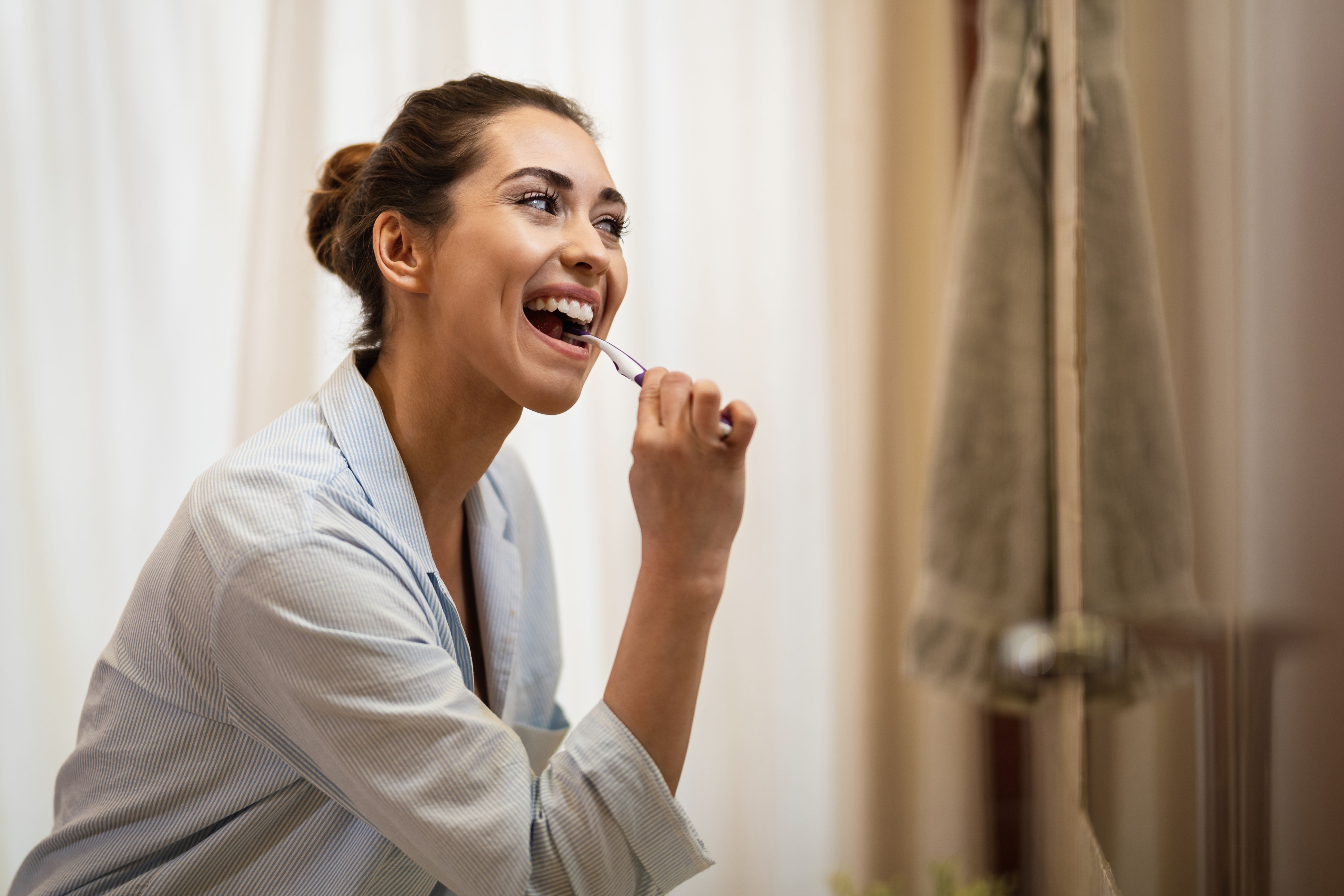October 16, 2025
Morning vs. Night Brushing: What Dentists Really Recommend

Key Points
- 92% of dentists agree that nighttime brushing is more critical than morning brushing for preventing cavities and gum disease.
- Bacteria multiply 4 times faster during sleep when saliva production decreases, making nighttime oral hygiene essential.
- Skipping nighttime brushing allows plaque to harden into tartar in as little as 24-48 hours, requiring professional removal.
- Morning brushing removes overnight bacterial buildup and freshens breath, but plays a secondary role in cavity prevention.
- Brushing twice daily reduces the risk of cavities by 25% compared to once-daily brushing alone.
- 30% of adults admit to occasionally skipping nighttime brushing, unknowingly increasing their risk of dental problems.
- The dentists at Silver State Smiles provide personalized oral hygiene guidance to help patients maintain optimal dental health.
Overview
One of the most common questions patients ask during dental visits is whether morning or nighttime brushing matters more for oral health. While the standard recommendation is to brush twice daily, understanding the distinct purposes of each brushing session can dramatically improve your dental hygiene routine.
The truth is that both morning and night brushing serve important but different functions in maintaining oral health. However, from a purely preventive standpoint, nighttime brushing emerges as the more critical of the two for protecting against cavities, gum disease, and other dental issues.
Silver State Smiles explores the science behind morning and nighttime brushing, explaining what happens in your mouth during different times of day and providing evidence-based recommendations to optimize your oral hygiene routine for maximum protection.
1. The Nighttime Bacteria Multiplication Factor
The most compelling reason why nighttime brushing is considered more important relates to what happens in your mouth while you sleep. During sleep, saliva production decreases significantly, creating an ideal environment for bacterial growth.
Saliva serves as your mouth's natural defense system, washing away food particles, neutralizing acids, and providing disease-fighting substances throughout your mouth. When saliva flow reduces during sleep, bacteria can multiply up to 4 times faster than during waking hours, feeding on any food residue or sugars left on your teeth.
What Happens Without Nighttime Brushing
- Bacterial colonies expand rapidly without saliva's protective effects
- Acid production from bacteria increases, attacking tooth enamel
- Plaque accumulates and begins hardening into tartar
- Gum tissue becomes inflamed from bacterial exposure
- Bad breath compounds develop overnight
Brushing before bed removes the food particles and sugars that bacteria feed on, significantly reducing bacterial activity during sleep. This simple action prevents the 8-hour bacterial feeding frenzy that occurs when you skip nighttime brushing.
2. Plaque Hardening and Tartar Formation
Nighttime brushing plays a critical role in preventing plaque from hardening into tartar, a transformation that has serious implications for your dental health.
Plaque is the soft, sticky film of bacteria that constantly forms on your teeth. When left undisturbed for 24-48 hours, this soft plaque begins mineralizing and hardening into tartar (also called calculus). Once tartar forms, it cannot be removed by regular brushing and requires professional dental cleaning.
Skipping nighttime brushing means plaque sits undisturbed for the longest possible period (from dinner through breakfast), giving it maximum opportunity to harden. This is why 92% of dentists emphasize nighttime brushing as the most important brushing session for cavity and gum disease prevention.
3. Morning Brushing: Purpose and Benefits
While nighttime brushing prevents long-term damage, morning brushing serves different but valuable purposes in your oral hygiene routine.
Morning brushing primarily addresses the bacterial buildup that occurred overnight despite your evening brushing efforts. Even with perfect nighttime hygiene, some bacterial activity continues during sleep, creating the "morning breath" everyone experiences and leaving a coating of bacteria on teeth.
Morning Brushing Benefits
- Removes overnight bacterial accumulation
- Eliminates compounds causing bad breath
- Provides fresh feeling to start the day
- Removes any debris from nighttime snacking
- Creates fluoride protection before eating breakfast
Morning brushing is less about preventing long-term dental disease and more about maintaining oral freshness and providing a clean surface before you consume breakfast. The fluoride from morning toothpaste also provides protective benefits throughout the morning hours.
4. The Timing Question: Before or After Breakfast?
A common debate surrounding morning brushing involves whether to brush before or after breakfast. The answer depends on what you eat and your individual circumstances.
Brushing before breakfast removes overnight bacterial buildup and provides fluoride protection, but means your teeth will be coated with food residue after eating. Brushing after breakfast cleans away breakfast remnants but can potentially damage enamel if you have consumed acidic foods or beverages.
Before Breakfast Advantages
- Removes bacteria before they feed on breakfast sugars
- Provides fluoride protection during morning meal
- Easier to maintain consistent routine
- Prevents brushing on acid-softened enamel
- Takes advantage of increased morning saliva flow
After Breakfast Considerations:
- Removes food particles from breakfast
- Requires 30-minute wait after acidic foods
- May disrupt morning schedule
- Can damage enamel if done too soon after eating
- Better for removing visible food debris
5. The Twice-Daily Standard
While understanding the relative importance of morning versus night brushing is valuable, the real goal is establishing a consistent twice-daily brushing routine.
Research clearly demonstrates that brushing twice a day reduces cavity risk by 25% compared to brushing once a day. This means that even though nighttime brushing is more critical for prevention, skipping morning brushing still leaves you more vulnerable to dental problems than maintaining both sessions.
The ideal routine involves brushing for 2 minutes before bed and again in the morning, using fluoride toothpaste and proper technique. This schedule provides maximum protection while fitting naturally into most people's daily routines.
6. Common Brushing Mistakes That Undermine Both Sessions
Beyond timing, how you brush matters enormously for the effectiveness of both your morning and nighttime oral hygiene routines.
Many people brush too quickly, use too much pressure, miss critical areas, or use incorrect techniques that reduce the protective benefits of brushing regardless of when it occurs. These mistakes can turn even a twice-daily routine into inadequate dental care.
7. Special Circumstances and Individual Needs
While general recommendations favor nighttime brushing as most important, individual circumstances can modify these guidelines for specific patients.
People with certain medical conditions, dietary habits, or dental concerns may need customized oral hygiene routines that emphasize different aspects of care. What works for the average person may need adjustment based on your unique situation.
Situations Requiring Modified Routines
- Dry mouth conditions requiring more frequent brushing
- Braces or dental appliances needing extra attention
- High cavity risk requiring midday brushing
- Gum disease necessitating additional cleaning
- Dietary habits involving frequent snacking
- Medications causing increased plaque formation
Your dentist can provide personalized recommendations based on your dental history, current oral health status, and risk factors. Regular dental checkups allow your dentist to assess whether your current routine is adequately protecting your teeth or needs modification.
Professional Dental Care and Guidance
While proper home brushing is fundamental to oral health, professional dental care remains essential for maintaining optimal dental hygiene and catching problems early.
Silver State Smiles provides dental care including routine cleanings, examinations, and personalized oral hygiene coaching. Professional cleanings remove tartar buildup that home brushing cannot address, while examinations detect cavities, gum disease, and other issues in their earliest, most treatable stages.
Monitoring Your Oral Health Results
To ensure your brushing routine is effectively protecting your dental health, watch for these indicators of good oral hygiene:
- Gums that are pink, firm, and do not bleed when brushing
- Fresh breath throughout the day
- Smooth tooth surfaces without visible plaque buildup
- No sensitivity to hot, cold, or sweet foods
- Positive feedback during dental checkups
- Minimal plaque accumulation between professional cleanings
If you notice bleeding gums, persistent bad breath, tooth sensitivity, or visible plaque despite regular brushing, schedule a dental appointment to address potential problems and optimize your oral hygiene routine.
Building Better Brushing Habits
Knowing that nighttime brushing matters most is only valuable if you consistently follow through with proper oral hygiene. Creating sustainable habits requires understanding what prevents people from maintaining good routines and implementing strategies to overcome these obstacles.
Many adults struggle with nighttime brushing because they are tired and ready for bed, making it tempting to skip this critical step. Setting reminders, keeping toothbrushes easily accessible, and establishing brushing as a non-negotiable part of your bedtime routine helps ensure consistency. Consider brushing right after dinner rather than waiting until you are exhausted before bed.
If you find yourself frequently skipping brushing sessions, examine what barriers are preventing consistency. Are you too tired at night? Keep a toothbrush near your favorite evening relaxation spot. Do you rush through mornings? Set your alarm 5 minutes earlier. Identifying and addressing specific obstacles makes maintaining proper oral hygiene dramatically easier.
The dentists at Silver State Smiles understand that knowing what to do and actually doing it consistently are two different challenges. During your appointments, discuss any difficulties you face with your oral hygiene routine so your dental team can provide practical strategies tailored to your lifestyle and circumstances. Investing a few minutes twice daily in proper brushing protects your smile for a lifetime.

Schedule Your Visit Today
Experience exceptional dental care in a comfortable, state-of-the-art environment. New patients welcome!
